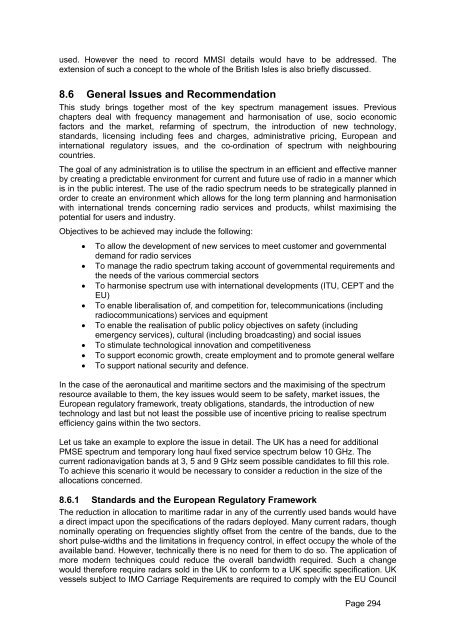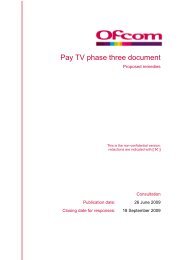FINAL REPORT - Stakeholders - Ofcom
FINAL REPORT - Stakeholders - Ofcom
FINAL REPORT - Stakeholders - Ofcom
Create successful ePaper yourself
Turn your PDF publications into a flip-book with our unique Google optimized e-Paper software.
used. However the need to record MMSI details would have to be addressed. The<br />
extension of such a concept to the whole of the British Isles is also briefly discussed.<br />
8.6 General Issues and Recommendation<br />
This study brings together most of the key spectrum management issues. Previous<br />
chapters deal with frequency management and harmonisation of use, socio economic<br />
factors and the market, refarming of spectrum, the introduction of new technology,<br />
standards, licensing including fees and charges, administrative pricing, European and<br />
international regulatory issues, and the co-ordination of spectrum with neighbouring<br />
countries.<br />
The goal of any administration is to utilise the spectrum in an efficient and effective manner<br />
by creating a predictable environment for current and future use of radio in a manner which<br />
is in the public interest. The use of the radio spectrum needs to be strategically planned in<br />
order to create an environment which allows for the long term planning and harmonisation<br />
with international trends concerning radio services and products, whilst maximising the<br />
potential for users and industry.<br />
Objectives to be achieved may include the following:<br />
• To allow the development of new services to meet customer and governmental<br />
demand for radio services<br />
• To manage the radio spectrum taking account of governmental requirements and<br />
the needs of the various commercial sectors<br />
• To harmonise spectrum use with international developments (ITU, CEPT and the<br />
EU)<br />
• To enable liberalisation of, and competition for, telecommunications (including<br />
radiocommunications) services and equipment<br />
• To enable the realisation of public policy objectives on safety (including<br />
emergency services), cultural (including broadcasting) and social issues<br />
• To stimulate technological innovation and competitiveness<br />
• To support economic growth, create employment and to promote general welfare<br />
• To support national security and defence.<br />
In the case of the aeronautical and maritime sectors and the maximising of the spectrum<br />
resource available to them, the key issues would seem to be safety, market issues, the<br />
European regulatory framework, treaty obligations, standards, the introduction of new<br />
technology and last but not least the possible use of incentive pricing to realise spectrum<br />
efficiency gains within the two sectors.<br />
Let us take an example to explore the issue in detail. The UK has a need for additional<br />
PMSE spectrum and temporary long haul fixed service spectrum below 10 GHz. The<br />
current radionavigation bands at 3, 5 and 9 GHz seem possible candidates to fill this role.<br />
To achieve this scenario it would be necessary to consider a reduction in the size of the<br />
allocations concerned.<br />
8.6.1 Standards and the European Regulatory Framework<br />
The reduction in allocation to maritime radar in any of the currently used bands would have<br />
a direct impact upon the specifications of the radars deployed. Many current radars, though<br />
nominally operating on frequencies slightly offset from the centre of the bands, due to the<br />
short pulse-widths and the limitations in frequency control, in effect occupy the whole of the<br />
available band. However, technically there is no need for them to do so. The application of<br />
more modern techniques could reduce the overall bandwidth required. Such a change<br />
would therefore require radars sold in the UK to conform to a UK specific specification. UK<br />
vessels subject to IMO Carriage Requirements are required to comply with the EU Council<br />
Page 294
















